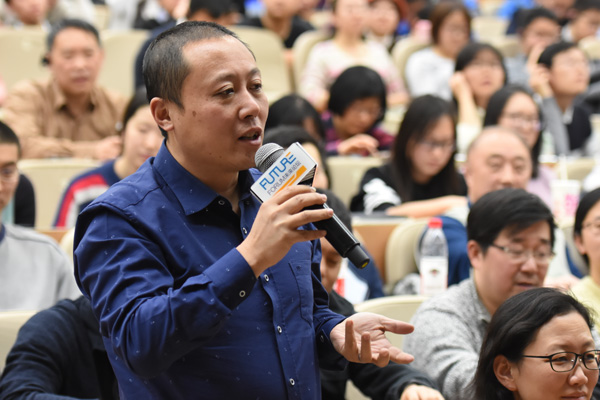 |
|
An audience member during the Q&A session at the lecture. [Photo provided to China Daily] |
Q&A
Rainer Weiss, US physicist and Nobel laureate
What would happen to the gravitational wave if it's fast enough to reach the edge of the expanding universe?
That depends a lot on what the real model of the universe is.
We have different models of the universe.
The one we now believe in the most is the one which is very depressing, the one which expands faster with time. What happens is the gravitational wave just gets weaker and weaker and weaker ... going out to infinity and there is no edge.
As a scientist, what do you want to say to the media and science communicators?
I like to communicate with people about science, especially young people because they get so excited if you explain it right to them.
If you don't use big words or a lot of mathematics, they grab it, and they really love it. When you explain to somebody how a rainbow works, with little reflections inside the drops, kids get intensely excited about that.
What I like is ... kids get enamored by what they have. Adults shouldn't lose that.
One of the reasons why it's fun to talk to kids and explain science to them is because you really open their eyes to something.
You experience so much more if you understand something. It's like somebody reads you a poem, and the words are there. If somebody explains to you what the poem really says, that makes the poem even more interesting.
I go to talk to high schools, grades schools and even talk to kindergartens. The more you can do that, the more likely they will go home and explain to their parents what they saw. Parents will get drawn in a little themselves. That's the way we are saving the world.
Kip Stephen Thorne, US theoretical physicist and Nobel laureate
Do you believe time travel is possible?
We have an educated guess based on a lot of calculations on the laws of nature that the probability to time travel is very small, but we are not sure.
The issue is there is a physical process, by which no matter how you make the time machine, the moment that it is activated, it will destroy itself.
The first thing that can travel through the time machine, go backward in time and return to where it started is light or vacuum fluctuations of the electromagnetic field or other fields in nature.
When we did the analysis, it looked to us that the explosion becomes sufficiently intense-you work on such a small time scale that the laws of physics that are used to do the calculation break down. You have to switch to use the quantum gravity that we don't understand.
Stephen Hawking and I agree that we're not likely to get an answer until we have the laws of quantum gravity, which also controls the growth of the universe and controls what happens inside the black holes.
How important is science communication?
Our world has major problems and opportunities that are technological and scientific. Global warming is perhaps one of the most important issues. If we're going to solve these problems, it is necessary that we get an understanding of them and enthusiasm about solving them from a large fraction of the world population.
That means people need to understand science-at least at the level of understanding that certain predictions are reliable and others are not, and knowing whom you can trust about scientific predictions and having some sense of how science is done.
We don't do well in educating the general population in America. I hope you do better in China.